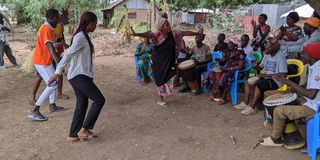Refugees seek to preserve, promote traditional musical heritage

A group of dancers from DRC Congo during a performance at the camp
Mr Elembe Chanja, a Congolese elder at the Kakuma refugee camp is a worried man after it dawned on him that traditional African musical sounds and songs were under threat.
The refugee camp was established in 1992 following the arrival of the “lost boys of Sudan”. It has over 190,000 residents and more than 20 nationalities.
Mr Chanja realised that a new generation of refugees were born at the camp under appalling living conditions and this frequently led to conflicts.
"Those born in the camp are not in touch with the history and culture of their countries of origin, especially musical instruments, songs, food and dances. Most are rendered idle and left to indulge in wasteful alcohol and drug abuse," Mr Chanja said.
Because musical instruments were not a priority when refugees fled their countries and came to live in Kakuma, he formed Umoja Ipo Group three years ago to bring together men and women from the Congo and conserve the culture and traditions of their community.
"We are far from home. We are growing old and we are forced to coexist with other communities, mainly from Africa, whose culture is totally different,” he explained.
“We saw a need to preserve our culture for our future generations through traditional music that youth and kids can easily relate to, so that they don't copy the dominant cultures through interaction."
He added: "When we have free time, we get the children to play with the instruments, bonding well with the culture where the drummers transfer skills through actively playing together with the young ones."

Kakuma Sound band comprising of performers from Congo, Burundi , Rwanda , South Sudan and Somali Bantu performing at Kakuma Refugee Camp.
The group first encouraged their compatriots to live in one neighbourhood, called Hong Kong, so that they could be united and can easily teach their children about their traditions that define their origins, habits, customs and beliefs.
Once they were united, he said, they could easily package their culture so that when they related with other nationalities they had a genuine and original identity that could be associated with their country of origin.
"Our traditions value unity and that is why when Congolese move to a new place they settle near each other so that they don't lose their cultural values by copying others," Mr Chanja said.
The group received a shot in the arm in October 2020 when it was among the beneficiaries of grants totalling Sh2 million from the Guggenheim Fellowship (US), Roskilde Foundation (Denmark) and Africa Express Foundation (UK) for the Kakuma Sound project to purchase traditional musical instruments for various cultural groups in the camp.
The project’s goal was to reconnect refugees from different nationalities, including South Sudan, Democratic Republic of Congo, Burundi, Sudan, Uganda, Somalia and Ethiopia, with their traditional instruments to first preserve and protect their diverse traditional music and earn a living as performers.

Dancers and drummers from a traditional Burundi group rehearsing.
Kakuma Sounds co-founder Treynor Tumwa said that besides distributing instruments that included traditional drums like the djembe, conga and sukuti they would ensure that spaces were created for permanent rehearsals and performances.
"We want to ensure diverse cultures within the refugee camp will never die. That is why for the first time we will have an International Kakuma Sound Cultural Festival on July 16-17 to provide a platform where refugees will showcase cultural dances, regalia, musical instruments and food," Mr Tumwa said.
The main objective of the event is to create awareness among refugees that cultural diversity should not separate them but bring collective strength to improve their lives in the camp while fostering harmony and peace among them through music.
Mr Eliaz Chiiza, from Burundi, said that through the initiative they foresee a camp where there is no violence and idling.
"We fully embrace the initiative that seeks to ensure we coexist harmoniously and appreciate different cultures and pass them to descendants," Mr Chiiza said.
Through cultural festivals, frequent community interactions would eliminate conflict between refugees and host communities, as well as internally to avoid incidents like when the Nuer and Dinka communities from South Sudan clashed in 2014 following an attempted rape incident that left one person dead and five others injured.
Ms Rose Nagumdipin, a Congolese, said she was eagerly waiting for the cultural festival as she would have an opportunity to appreciate the cultures of other nationalities.





